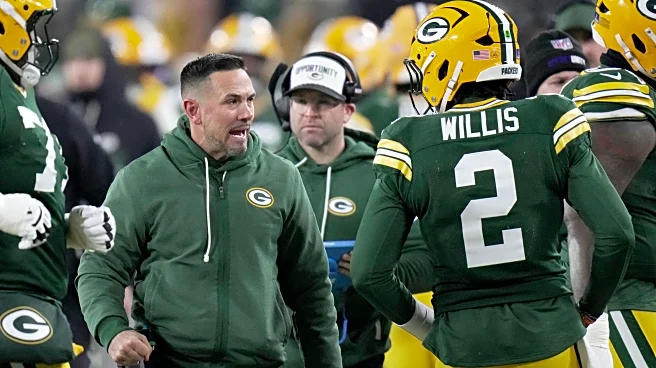Rapid Read • 8 min read
Wrexham AFC faced a challenging match against West Bromwich Albion, resulting in a 3-2 defeat during their first home fixture in the Championship since 1982. The match, attended by team owners Ryan Reynolds and Rob McElhenney, showcased the competitive nature of England's second-tier football. West Brom took the lead early with Isaac Price scoring in the 20th minute. Wrexham's Lewis O'Brien equalized before halftime, but West Brom regained control with goals from Jed Wallace and Price again, securing a two-goal advantage. Despite a late goal from Wrexham's Sam Smith, West Brom held on to win, moving to the top of the Championship table.
AD
The match highlights the challenges Wrexham faces in adapting to the competitive environment of the Championship. The presence of high-profile owners like Ryan Reynolds and Rob McElhenney brings significant attention to the club, potentially influencing its commercial and fan engagement strategies. The defeat underscores the need for strategic adjustments and player development to compete effectively at this level. Success in the Championship could lead to increased investment and sponsorship opportunities, benefiting the club's long-term growth and stability.
Wrexham will need to reassess their strategies and player lineup to improve their performance in upcoming matches. The team may consider tactical changes or player acquisitions to strengthen their squad. The owners' involvement could lead to increased media coverage and fan support, providing a morale boost. As the season progresses, Wrexham's ability to adapt and compete will be crucial in determining their standing in the Championship and their future prospects.
The involvement of celebrity owners in football clubs like Wrexham highlights a growing trend of entertainment figures investing in sports teams. This can lead to increased visibility and fan engagement, but also places pressure on the team to perform well under the spotlight. The cultural impact of such ownership can influence the club's identity and community relations, potentially attracting a diverse fan base and fostering international interest in lower-tier football leagues.
AD
More Stories You Might Enjoy













